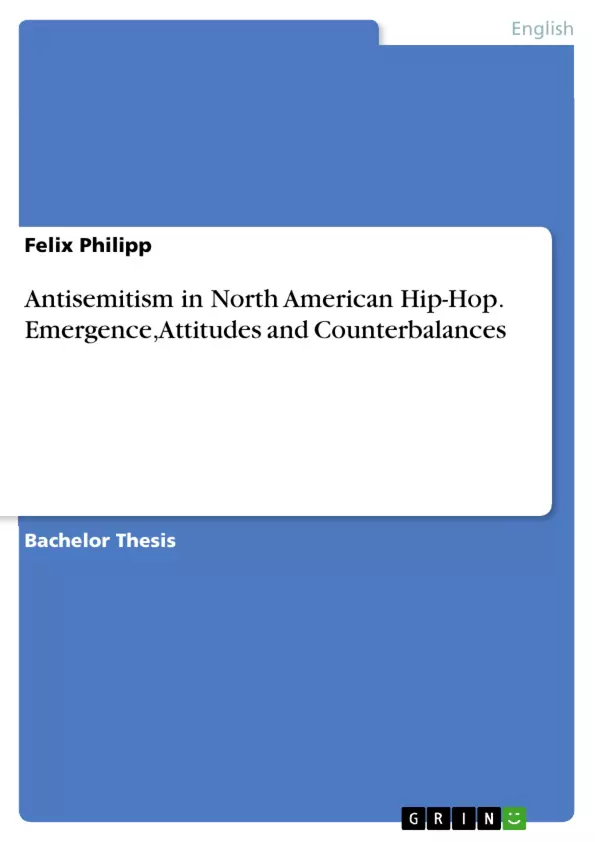This bachelor's thesis from the field of Cultural Studies in North American Studies deals with the emergence of antisemitic texts and attitudes, as well as the counterbalance to them in US-American and Canadian hip-hop and rap. First, the history of antisemitism and that of hip-hop are addressed before specifically antisemitic texts and currents in hip-hop are examined. In this context, the antisemitism promoted by the "Nation of Islam" and the collaboration of members or sympathizers of the latter with musicians of the scene are particularly striking. Public Enemy is a hip-hop group that chose drastic lyrics in order to emancipate itself, but at the same time deliberately used anti-Jewish and anti-Israeli stereotypes. This is followed by examinations of the lyrics of selected songs by Public Enemy, Jay-Z, Ice Cube, and by 21 Savage, as well as Snoop Dogg's relationship to the "Nation of Islam." As a counterweight to these developments in hip-hop culture, Drake, whose father is a person of color and whose mother is Jewish, is the subject. He unites the sides that have been played off against each other for decades, and could break prejudices with his music.
Inhaltsverzeichnis (Table of Contents)
- Introduction
- The cultural background of hip-hop and African-American suppression
- Hip-hop and the African-American struggle for a voice
- The Nation of Islam an introduction
- Antisemitism
- The origins of discrimination against Jews
- The concept of antisemitism and the concept of stereotypes
- The African-American and Jewish relationship
- The alliance, the breakup and the emergence of hatred
- The Nation of Islam's antisemitism and Louis Farrakhan as a key figure
- American hip-hop's antisemitism
- Public Enemy – between rebellion and heavy antisemitism
- Ice Cube one antisemitic outburst?
- Jay Z - part-time antisemitism?
- 21 Savage - embodying the new generation of African-American hip-hop
- Snoop Dogg and his relation to the Nation of Islam
- Drake a culturally hybrid rapper
- Conclusion of my findings
Zielsetzung und Themenschwerpunkte (Objectives and Key Themes)
The main objective of this thesis is to examine the expression of antisemitism in hip-hop music, from its early years to the present. The thesis investigates the use of antisemitic stereotypes by hip-hop artists and cultural movements, exploring the interplay between the origins of hip-hop in African-American communities, the history of antisemitism, and the influence of the Nation of Islam.
- The origins and development of hip-hop culture and its relationship to African-American social movements.
- The historical background of antisemitism and the prevalence of antisemitic stereotypes.
- The role of the Nation of Islam in shaping antisemitic views within African-American communities.
- The manifestation of antisemitism in the lyrics and public statements of prominent hip-hop artists.
- The evolving nature of hip-hop culture and the representation of Jewish identity within the genre.
Zusammenfassung der Kapitel (Chapter Summaries)
The first chapter introduces the research question and hypothesis, focusing on the prevalence of antisemitism in hip-hop music, particularly in comparison to the German music scene. It outlines the historical context of the research and the framework for analyzing antisemitic stereotypes.
The second chapter delves into the cultural and musical background of hip-hop, tracing its emergence from the Black Power and Black Arts movements. It explores the socioeconomic conditions in the Bronx that contributed to the rise of hip-hop as a form of expression and resistance. This chapter also examines the historical context of the Black Power movement and its influence on the development of hip-hop.
The third chapter provides a brief history of antisemitism and examines common antisemitic stereotypes. This chapter serves as a foundation for understanding the antisemitic themes that emerge in the following chapters, particularly those related to the Nation of Islam and the lyrics of various hip-hop artists.
The fourth chapter explores the African-American and Jewish relationship, examining the history of collaboration and conflict. It focuses on the Nation of Islam, its leaders, and the spread of antisemitic rhetoric within the organization. The chapter also analyzes the impact of these views on cultural movements and hip-hop music.
The fifth chapter investigates the presence of antisemitism within American hip-hop music. It analyzes the lyrics and public statements of prominent artists, including Public Enemy, Ice Cube, Jay-Z, 21 Savage, Snoop Dogg, and Drake. This chapter examines the various ways in which antisemitic stereotypes are used and challenges the evolution of hip-hop culture and its relationship to Jewish identity.
Schlüsselwörter (Keywords)
The primary keywords and focus topics of this thesis include: antisemitism, hip-hop, African-American culture, Nation of Islam, Louis Farrakhan, Public Enemy, Ice Cube, Jay-Z, 21 Savage, Snoop Dogg, Drake, stereotypes, cultural movements, and Jewish identity. The thesis explores the interplay of these themes, investigating the historical, social, and musical factors that contribute to the expression of antisemitic views in hip-hop music.
Frequently Asked Questions about Antisemitism in Hip-Hop
What is the focus of this bachelor's thesis?
The thesis examines the emergence of antisemitic lyrics and attitudes in North American hip-hop and the cultural counterbalances to them.
Which organization is linked to antisemitism in the hip-hop scene?
The "Nation of Islam" and its leader Louis Farrakhan are identified as significant influences on antisemitic rhetoric in certain hip-hop circles.
Which hip-hop groups or artists are specifically analyzed?
The thesis analyzes lyrics from Public Enemy, Ice Cube, Jay-Z, and 21 Savage regarding anti-Jewish stereotypes.
Who is presented as a positive counterbalance to antisemitic trends?
The rapper Drake is discussed as a counterbalance, uniting African-American and Jewish identities through his heritage.
What is the historical context of hip-hop mentioned in the study?
It traces hip-hop back to the Black Power and Black Arts movements as a struggle for a voice within suppressed communities.
- Quote paper
- Felix Philipp (Author), 2020, Antisemitism in North American Hip-Hop. Emergence, Attitudes and Counterbalances, Munich, GRIN Verlag, https://www.grin.com/document/1356446



